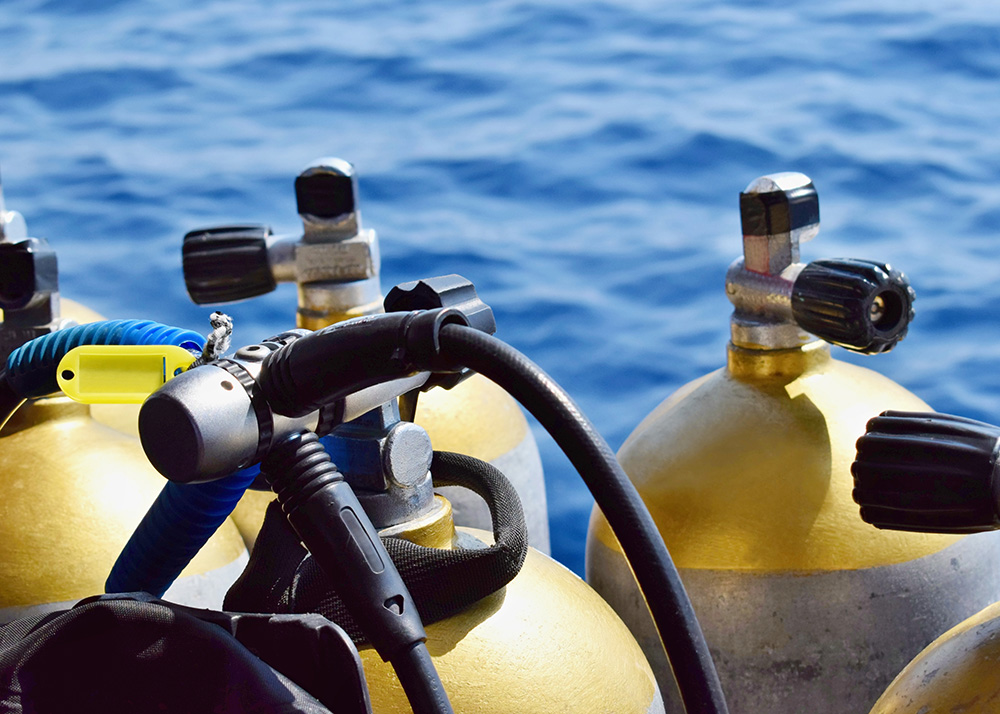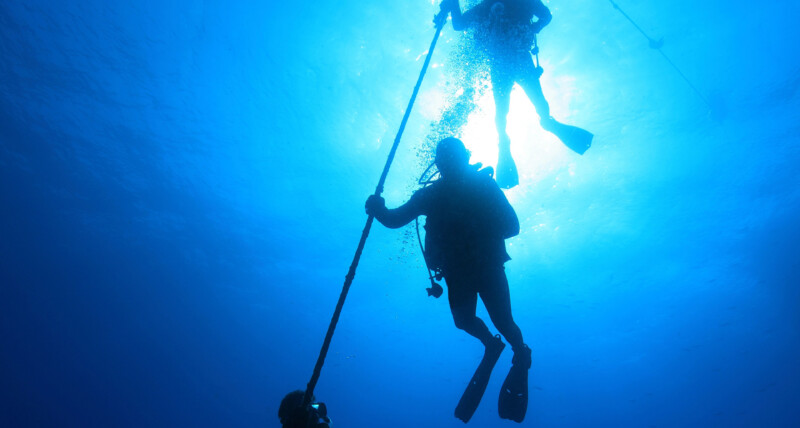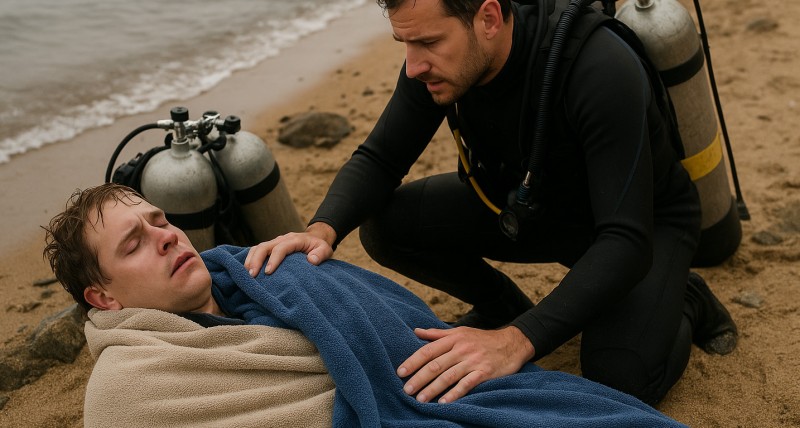For many adults, the idea of gliding effortlessly through an underwater world filled with vibrant marine life is both thrilling and serene. Scuba diving offers a glimpse into a hidden planet—a silent, weightless, and often profoundly moving experience. But for those who are new to diving, one question frequently comes up:
“Do I need to be certified to scuba dive?”
As a professional scuba instructor who teaches private lessons exclusively for adults, I hear this question often, usually from people who are intrigued by scuba diving but hesitant about committing time or money before trying it out. The answer is both straightforward and nuanced. In this article, I’ll cover the legal and practical implications of diving without certification, the obstacles you’ll face if you’re uncertified, and why certification isn’t just a box to check—it’s your passport to safe, confident, and independent diving.
Is Certification Legally Required to Scuba Dive?
Let’s start with the legal aspect.
In the United States and many other countries, there are no federal or state laws that outright prohibit scuba diving without certification. Scuba diving is considered a recreational activity, not a regulated profession. That means if you want to buy your own scuba gear, jump in the ocean, and descend into the deep—technically, no one will stop you.
However, there’s a catch.
Most dive-related businesses—dive shops, equipment rental facilities, dive boats, and air fill stations—are not required by law to check your certification, but they almost always will. Why? Liability. If a dive shop rents scuba gear to someone who is not certified, and that person is injured or dies, the shop could face enormous legal and financial consequences.
In practice, this means that:
You cannot rent scuba equipment without proof of certification.
You cannot get your tanks filled with compressed air or nitrox without certification.
You will not be permitted on most dive boats or organized trips unless you show your cert card.
In effect, this makes scuba certification a de facto legal requirement for anyone who wants to dive independently.
Try Diving Before You Commit: Discover Scuba Programs
If you’re unsure whether scuba diving is right for you, the good news is you don’t have to commit to a full certification course right away. Most professional agencies—like PADI (Professional Association of Diving Instructors) and SDI (Scuba Diving International)—offer “Discover Scuba Diving” or “Try Scuba” programs.
These half-day to one-day experiences allow you to try diving in a pool or shallow open water under the direct supervision of an instructor. You’ll be outfitted with all necessary gear, given a basic safety briefing, and guided through your first underwater breaths in a controlled environment.
While these experiences are eye-opening and often spark a lifelong passion, they are not certification programs. You will not be allowed to rent gear or dive without an instructor afterward.
Why Get Certified? The Practical Benefits
Let’s talk about what certification actually gives you—and why it’s so valuable.
When you complete a certification course like the Open Water Diver course from PADI, SDI, or NAUI, you are trained in:
Diving physics and physiology
Underwater navigation
Buoyancy control
Emergency procedures
Dive planning and safety checks
This knowledge is not just academic. It empowers you to dive safely, confidently, and with awareness of the potential risks involved. Most importantly, it trains you to dive independently, without direct instructor supervision.
Some of the key benefits include:
1. Equipment Rental Access
As mentioned earlier, dive shops will not rent you tanks, regulators, BCDs, or weights unless you show proof of certification. This is true almost universally—especially in the United States. Liability insurance and best practices demand it.
Even abroad, in countries where regulations may be more relaxed, reputable shops still follow certification checks as part of their risk management.
2. Join Dive Boats and Excursions
Want to join a diving trip in Cozumel or the Florida Keys? Operators will ask for your certification card—often along with a recent dive log to confirm you’re still an active diver. Without certification, you’ll either be denied or forced into a supervised, shallow try-dive, if offered.
3. Buy and Use Scuba Equipment Properly
While you can purchase scuba gear without certification, using it safely and effectively requires training. Certified divers know how to assemble and test their gear, control their buoyancy, handle underwater emergencies, and ascend slowly to avoid decompression sickness. Certification ensures you not only have access to the gear, but that you know how to use it responsibly.
4. Dive Anywhere in the World
Once certified, your cert card is recognized globally. Whether you’re diving the wrecks of the Great Lakes, the coral reefs of the Caribbean, or volcanic lava tubes in Hawaii, your training gives you the freedom to explore. You’re no longer tied to an instructor or limited to shallow, supervised dives.
5. Safety and Confidence
Diving is inherently safe when you follow the rules—but dangerous when you don’t. Certification courses teach you how to monitor your air supply, equalize pressure, manage depth and bottom time, and what to do if something goes wrong. That knowledge could save your life or your buddy’s.
What Happens if I Dive Without Certification Anyway?
If you attempt to dive without certification—say, by borrowing a friend’s gear and heading out on your own—you’re exposing yourself to serious risks. These include:
Improper weighting and buoyancy issues
Equipment misuse or failure
Panic underwater or at depth
Lack of response in an emergency situation
Increased likelihood of injury or fatality
You’re also putting others at risk—especially your dive buddy or any local emergency responders who might need to assist you. And if you injure yourself or others, your insurance may not cover the cost of medical evacuation or hyperbaric treatment if you weren’t a certified diver acting responsibly.
Obstacles Faced by Uncertified Divers
To summarize, here’s what uncertified divers will struggle to do:
✅ Rent scuba gear
✅ Refill scuba tanks
✅ Dive on any charter boat
✅ Buy dive travel insurance
✅ Join most guided group dives
✅ Dive at dive resorts or liveaboards
✅ Receive any official scuba training beyond introductory sessions
In short: if you’re not certified, the diving world is essentially off-limits unless you are under the constant supervision of a licensed instructor during a try-dive program.
Is Certification Difficult? How Long Does It Take?
Not at all. Most Open Water Diver certifications can be completed in three to four days and include:
Knowledge development – usually completed online at your own pace.
Confined water dives – skill practice in a pool or pool-like setting.
Open water dives – typically four dives over two days in a lake, spring, or ocean environment.
Private instruction, like the kind I provide for adult learners, allows you to complete training on your schedule, with personalized attention and more flexibility. Many adults prefer this format, especially if they’re anxious about learning in a group setting.
Conclusion: Certification Is Your Key to the Underwater World
So, do you need to be certified to scuba dive? Legally, no—but practically and safely, absolutely yes.
Certification is more than a formality. It’s your foundation for safe, enjoyable, and independent diving. It opens doors to gear rental, dive boats, exotic destinations, and deeper adventures—literally and figuratively.
If you’re curious about diving but unsure whether certification is right for you, consider a Discover Scuba session to get your feet wet. But if you’re ready to explore the underwater world on your terms, with the freedom to dive almost anywhere in the world, invest in certification. It’s the smartest and safest way to begin your scuba journey.
If you’re an adult interested in private scuba lessons tailored to your needs, comfort level, and schedule, I specialize in guiding professionals, couples, and solo adventurers through the certification process with patience, professionalism, and a sense of discovery. Let’s dive into your new passion together.hal




